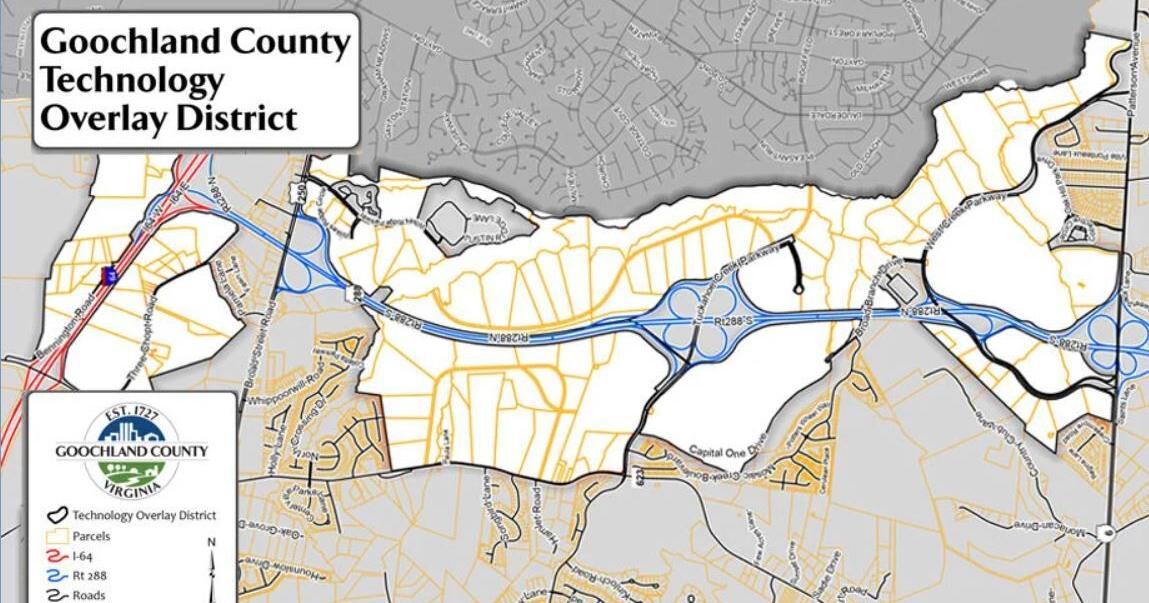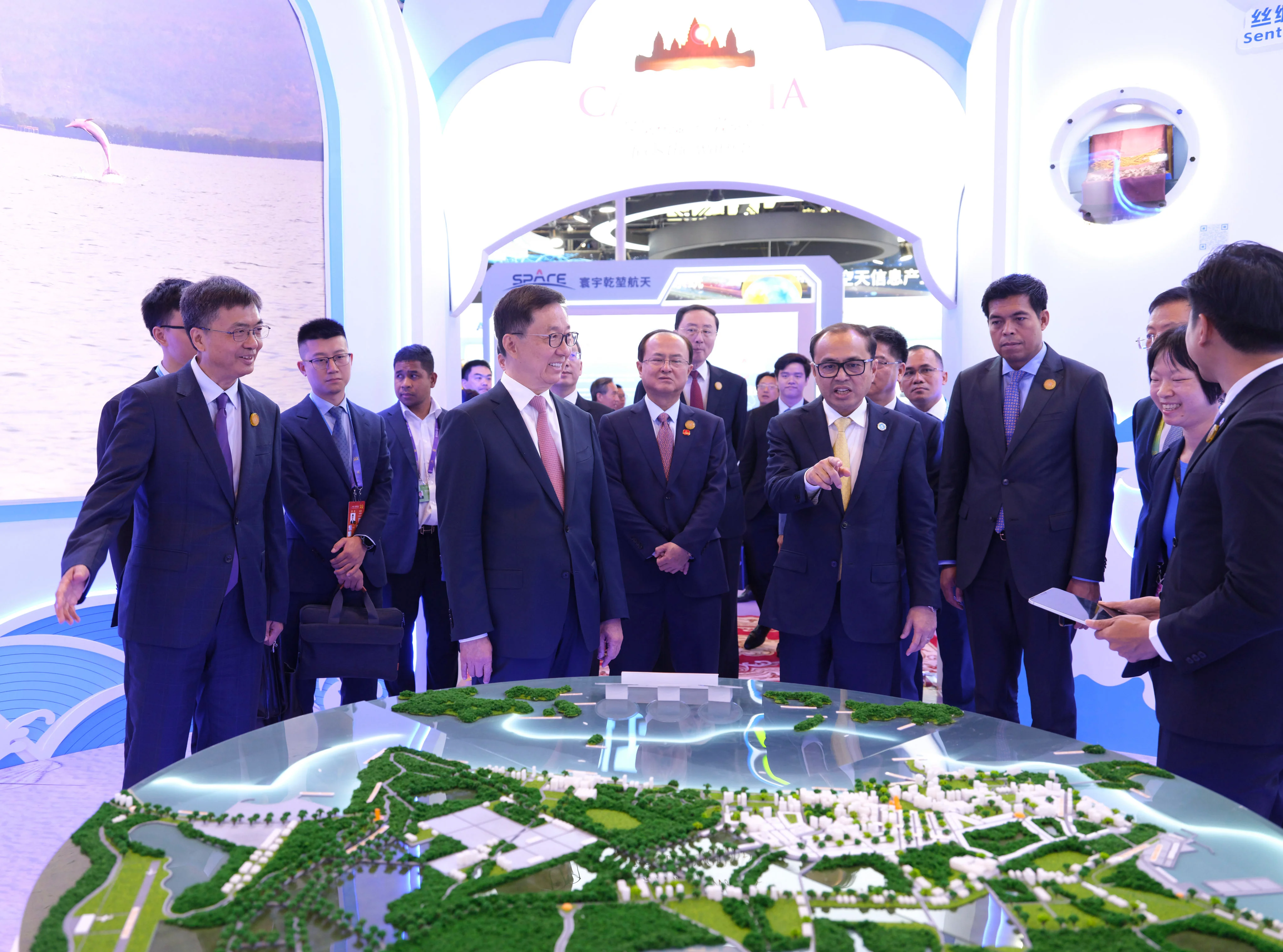
Hundreds of Goochland residents across several eastern neighborhoods have organized to push back against a proposed technology zone aimed at attracting tech businesses like data centers.
The zone runs along much of Goochland’s eastern border with Henrico County. It covers about 2% of the county’s landmass from the James River to areas north of Interstate 64.
Much of the 3,500 West Creek Business Park falls within the zone. The park is home to Capital One’s 300-acre campus and roughly 1,700 acres of undeveloped land. County officials say the district could help attract tax dollars to support public services while preventing unchecked development across the county.
Residents, however, have voiced concerns about noise from data centers, emissions from hundreds of backup diesel generators, and the size and proximity of potential buildings. The current proposal would also allow small modular nuclear reactors and natural gas peaking plants, raising safety concerns.
“We cannot be half community and half industrial park,” said Arnold Rosenberg, who spoke for residents of Mosaic at West Creek, a 55+ community of more than 1,000 residents. “We cannot be half a safe haven for families and half a sacrifice zone for economic development.”
The planning commission heard public comments for nearly three and a half hours Thursday night, with an extension scheduled for Sept. 25 before commissioners make a final decision.
“Make no mistake, we’re battling a data center rezoning tonight. Not because we have an applicant with facts, figures, actual impacts or locations,” said Rob Williamson, of Manakin Sabot. “If (the proposed conditions are) approved … henceforth and forever more, the people affected will have no voice.”
The Technology Zone Proposal
The proposed technology area comes in two parts: a “Technology Zone,” which offers financial incentives to tech companies, and a “technology overlay district” (TOD), which regulates building design and setbacks for companies using those incentives.
Goochland proposes to reimburse up to 75% of permit fees for developers and up to 100% of utility connection fees, which can reach $2 million for large water users. Additional incentives would be granted on a case-by-case basis, subject to approval by the board of supervisors.
“Having this type of flexibility helps bring competitive businesses to Goochland County,” said Sara Worley, deputy county administrator for economic and community development.
“There are requirements for technology companies to receive incentives, and we purposefully made these requirements low because we want to be able to attract technology businesses of all sizes.”
Around 82% of Goochland’s income comes from residential taxes. Worley said the county’s long-term goal is shifting to roughly 70% residential and 30% commercial.
“Why does the county want or need these businesses? Technology businesses have the highest revenue-producing impacts in terms of taxes and high-quality jobs,” she said.
Companies seeking incentives would be required to create five full-time jobs in the tech district and invest a minimum of $500,000. Data centers and advanced manufacturing are already allowed in the West Creek Business Park, but companies opting into Technology Zone incentives could build higher than the current 80-foot limit— up to 120 feet — while having larger buffers.
“It sounds like the TOD actually provides a lot of protection for the residential neighborhoods if the (industrial) properties want to develop a data center in the future,” said Guy Kemmerly, District 1 commissioner. “Assuming property owners want to buy into these restrictions, which is why you’ve created incentives.”
Residents’ concerns
Despite these protections, residents argue the technology zone does not go far enough.
Brek Daughtery, of the Readers Branch neighborhood, said one concern is that distribution centers could also be incentivized. Such high-traffic, 24-hour businesses are “incompatible” with the area, he said, though other types of businesses could work with proper regulations.
Noise is a key issue. Residents want data center hum regulated to about 45 decibels, the sound of a whisper. The TOD currently allows 65 decibels during the day, or roughly the volume of normal conversation.
The proposal also allows two hours per week of louder backup generator testing. There is currently no noise limit for companies building in West Creek Business Park.
Data centers are typically accompanied by dozens of unfiltered diesel generators for emergency power, which must be tested monthly. When clustered, the number of generators could reach hundreds.
“While individual adverse effects of each generator can be small, collectively, we are seeing a rise in the impact on the environment,” said Bruce Silverman, medical director for Goochland CARES. “What would any of us pay for good health and longevity? Why would we give up our beautiful environment for a few dollars?”
Small modular nuclear reactors would be allowed in the northern TOD above Interstate 64. County officials said these could power nearby businesses or feed energy into the larger grid. There are no currently operating small modular nuclear reactors in the United States.
Chesterfield approved the world’s first grid-scale fusion plant on Wednesday, which won’t be operational until at least the early 2030s. Google also announced that it would build a data center complex in Chesterfield as part of a $9 billion Virginia expansion.
Residents expressed concern about cancer risks within 20 miles of a nuclear generator, potential accidents, and nuclear waste disposal.
“There’s not enough long-term data to justify turning Goochland into a test site. We are being asked to be guinea pigs for an experimental technology that has a huge liability for Goochland County,” said Melanie Lawrence, a resident.
A group called SmartGrowth Goochland is advocating for 3,000-foot distances between residential areas and data centers, electrical substations, nuclear reactors, advanced manufacturing, and other uses. The current proposal allows distances of about 550 feet from data centers.
Many of the local homeowners said they agreed with the idea of a technology district, but said they wanted more protection. Others questioned the need for it entirely.
Several speakers praised Eli Lilly’s recent announcement of a $5 billion drug-making facility in Goochland, saying it was preferable to the proposed technology businesses.
Goochland’s planning commission is expected to recommend or deny the technology overlay district at its next meeting on Thursday. The board of supervisors would then have to approve it.



